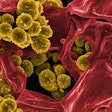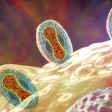
Researchers at the U.S. National Institutes of Health (NIH) have developed a new polymerase chain reaction (PCR) assay for the detection of Onchocerca volvulus, the parasite that causes onchocerciasis, known as river blindness, and are working to adapt it for easier field diagnosis of the disease.
O. volvulus is transmitted by blackflies breeding along fast-flowing rivers; the parasite infects humans via nests of larvae that can persist under the skin or in the eyes for up to 15 years. While O. volvulus infection is not fatal, the eventual death of the parasites causes an inflammatory response that may lead to blindness.
The NIH estimates that there are 18 million onchocerciasis infections in 31 countries annually; 40,000 of these infections result in permanent blindness. River blindness has a significant economic impact, as blinded adults may be unable to work, and children often leave school to care for them.
Currently, onchocerciasis is diagnosed through skin snips in warm buffer solution until the larvae emerge and can be confirmed using a lengthy test process using PCR assays and enzyme-linked immunosorbent assay, according to NIH helminth parasite researcher Sasisekhar Bennuru.
In a preprint published online in MedRxiv, Benneru and colleagues describe the molecular method they developed that detects repetitive elements in the parasite genome. The researchers discovered that the circulating cell-free DNA was not abundant enough in plasma for reliable detection; however, the identifying elements could be reliably detected in urine passed through a filter coated with polysaccharide chitosan.
The NIH team demonstrated that the noninvasive test had 100% specificity and more than a thirty-twofold increased sensitivity when compared to the gold-standard qPCR test.
Furthermore, the new assay can distinguish between O. volvulus and the closely related O. ochengi, which infects cattle exclusively. This is especially useful for onchocerciasis surveillance campaigns in disease-endemic areas to determine prevalence and transmission of the parasite in blackflies.
The NIH team will work to adapt the test to use CRISPR-Cas12 combined with methods such as recombinase polymerase amplification and loop-mediated isothermal amplification for increased sensitivity of the isothermal reactions.



















